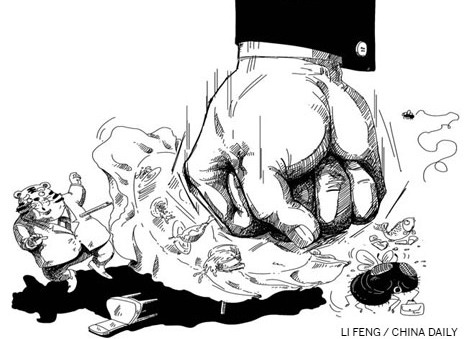
The Communist Party of China vowed on Wednesday to fight corruption firmly and to maintain its "high-handed posture" in the next five years.
"Corruption is still widespread. The soil that nourishes corruption still exists, and the situation remains critical and complicated," said a five-year plan (2013-17) on setting up a system to punish and prevent corruption, issued by the CPC Central Committee.
The fight against corruption has entered a new era thanks to the Decisions on Major Issues Concerning Comprehensively Deepening Reforms, issued by the Third Plenary Session of the 18th CPC Central Committee on Nov 15.
Part 10 of the document on reforms - supervision of power - explains the significance of effectively restricting and supervising power in all-round reform. Although some specific measures have been taken before, this is the first time the authorities have put all the measures together and addressed the question of supervision of power. The measures include restricting power through regulation and supervision of power by the people.
The document advances some new ideas and measures that could influence future development. For example, further reform of the discipline inspection and supervision system, especially the "dual leadership" in the CPC's discipline inspection system, could effectively restrict the use of power by officials. Plus, making it mandatory for senior officials to declare their assets will help build a sunshine government.
The document also advocates some microscopic but important new measures such as an inspection and accountability system for officials' selection and housing allotment. Its focus, however, is on reform of the CPC's discipline inspection system, which is expected to play a key role in China's anti-corruption drive.
Some people assume that "promoting concretization, routinization and institutionalization of the Party's discipline inspection work's dual leadership system", as mentioned in the document, goes against the spirit of the reform, that is, to grant greater autonomy to anti-corruption organs. But that is not true.
According to the Party Constitution, the current "dual leadership system" means discipline inspection work is mainly led by the Party commission of the same level, and higher level commissions only play the role of professional guide. Article 43 of the Party Constitution says: "The Party's Central Commission for Discipline Inspection functions under the leadership of the Central Committee of the Party. The Party's local commissions for discipline inspection at all levels and primary commissions for discipline inspection function under the dual leadership of the Party committees at the corresponding levels and the next higher commissions for discipline inspection."